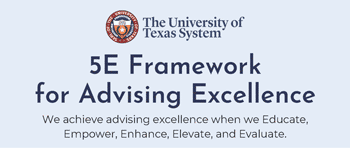Advising is one of three pillars of the UT System's student success framework.
Framework for Advising Excellence
To advance the Advising pillar of the UT System’s student success framework, the UT System works hard to recognize and support advisors and advising.
In place since 2017, the Advising pillar is articulated as a commitment to students: All UT students will receive the advising they need to help them discover clear pathways to degree completion and beyond.
Throughout 2017, an Advising Affinity Group developed a set of recommendations that coalesced around the UT System 5E Framework for Advising Excellence, using advising to: Educate and Empower students; Enhance communication between students and advisors; Elevate advisor career pathways and advising as a profession; and Evaluate institutional advising through continuous assessment and data-driven improvement.
The 5E Framework has been the foundation for advising reforms underway at the System’s nine universities, from integration of holistic advising across the colleges at UTEP, to hiring an assistant vice provost of advising at UT Arlington, to hiring additional advisors, salary increases and career ladders put in place at several others UT academic institutions, to on-campus professional development and recognition at UT San Antonio and UT Austin. These are but a few of the many outstanding programs and initiatives in place and under development across the UT System. UT institutions continue to implement and adapt the 5E Framework based on student needs, advisor needs, and institutional cultures and resources.
The 5E Framework has also played a key role in professional development provided for advisors across the UT System, including as the centerpiece of several systemwide advising institutes.
Advising Rubric
The UT System Excellence in Academic Advising Rubric represents the aspirational goal of improving advising across the UT System. It was developed by advising leaders and professionals from across the System and supports the Evaluate component of the 5E Framework for Advising Excellence. The rubric provides direction for evaluating institutional advising through continuous assessment and data-driven improvement. It is designed to reflect the different phases of improvement as programs attempt to reach full execution of the ideals of advising. The rubric is not intended to evaluate or assess individual advisors. Rather, it is intended to support advisors as professionals essential to the success of students as well as institutional effectiveness and responsiveness. This tool is intended to support a deeper understanding of the elements of high quality advising at an organizational level.
UT System Academic Advising Leadership Council
The UT System Academic Advising Leadership Council meeting monthly to address and advance systemwide academic advising issues. Members are listed below.
| Deidra Turner | Assistant Vice Provost for Advising and Engagement | UT Arlington |
| Cassandre Alvarado | Senior Associate Dean for Undergraduate Education and Teaching Excellence | UT Austin |
| Jeff Handy | Director of the Vick Advising Excellence Center | UT Austin |
| John Jackson | Associate Dean of Undergraduate Advising | UT Dallas |
| Heather Smith | Associate Vice President for Advising & Student Services | UT El Paso |
| TBD | UT Permian Basin | |
| Michael Frawley | Dean of Student Success | UT Permian Basin |
| Alicia Espinoza | Associate Director | UT Rio Grande Valley |
| Angelica Barrera | Associate Vice Provost for Student-Athlete Retention and Excellence | UT San Antonio |
| Marc Guidry | Associate Vice Provost for Academic Affairs | Stephen F. Austin State University |
| Sarah Bowdin | Assistant VP for Academic Success | UT Tyler |
Professional Development for Academic Advisors
Since 2018, the UT System has collaboratively planned and delivered a series of advising institutes with campus partners involved in overseeing and delivering advising to undergraduates at the nine academic institutions. The advising institutes serve multiple purposes to:
- Provide professional development for the UT System's professional advisors;
- Engage advisors in collective problem-solving and sharing of best practices; and
- Enable both cross-campus and inter-institutional networking.
Agendas and programs for each of the Advising Institutes may be found here: Professional Development | University of Texas System (utsystem.edu)


